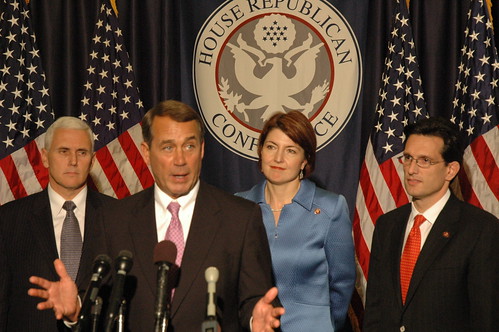By jwilkes
 Despite the fact that House Republicans will be defending 178 seats compared to 255 for Democrats (a 41% to 59% difference), GOP Representatives on the Hill are looking at the very real possibility of falling even further into the minority in 2010.
Despite the fact that House Republicans will be defending 178 seats compared to 255 for Democrats (a 41% to 59% difference), GOP Representatives on the Hill are looking at the very real possibility of falling even further into the minority in 2010.
Going into the 2006 midterm elections, Republicans held a 15-seat majority over Democrats. They lost 30 seats in that contest, flipping the majority to Democrats for the first time since the Republican Revolution of 1994. They didn’t fare any better in the 2008 elections, losing another 21 seats. Further losses in 2010 will push Democrats closer to a 2/3 majority that would make passing legislation incredibly easy for the majority party. And while the first midterm following the election of a new president tends to go against the president’s party in Congress, House Republicans are fearing the worst.
A Diageo/Hotline Poll released this week shows that 49% of American voters approve of the job Democrats are doing in Congress, with only 38% disapproving. That’s an enormous change considering that just a few weeks ago, Congress’ overall approval rating sat at a paltry 17%. The Republican report card might have a lot to do with it. According to that same poll, only 26% of voters approve of the GOP’s performance.
What should be more troubling is the generic ballot question. When asked whether they’d be more likely to support a Democrat or a Republican for Congress in 2010, Democrats garnered 46%, an astonishing 24-point advantage over their Republican counterparts, who inspired only 22% of the support.
Republicans are drawing further fire over the stimulus bill, which has been a divisive issue on the Hill over the past week. House GOP members have promised to unilaterally oppose the legislation, and in fact voted unanimously against it (the bill passed 244-188). But a Gallup poll last week showed that 52% of voters support the stimulus package, compared to just 39% against. Democrats are already planning on running ads in the Republicans’ home districts aimed at their opposition to the legislation.
What hurts Republicans even further is Obama’s popularity, which- though it’s less than two weeks into his fledgling presidency- shows little sign of waning. Democrats on Capitol Hill have gone to great lengths to align themselves with their charismatic party leader, and even some Republicans have expressed interest in working with the new Administration.
Their traditional small government position notwithstanding, Republicans are struggling to define themselves in an era when voters are expecting their elected representatives to do something to halt the precipitous economic slide. But as the GOP goes through a period of transition, with new party Chairman Michael Steele winning election Friday, it’s experiencing difficulty identifying itself as anything other than the opposition party.
That platform never plays well during election cycles. And unless the GOP can mount a quick turnaround, the poll numbers that show yet another year of crippling defeats just might come to fruition.



No comments:
Post a Comment